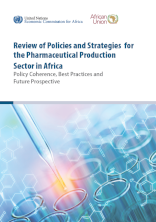Review of Policies and Strategies for the Pharmaceutical Production Sector in Africa

Africa faces significant challenges in accessing high-quality pharmaceuticals, exacerbating a continued high burden of disease. The availability of essential drugs in the public sector across the continent has been reported to be less than 60 per cent. One factor contributing to this shortfall is Africa’s heavy reliance on imported medicines. There is growing consensus that strengthening the continent’s ability to produce high-quality, affordable pharmaceuticals would have a positive impact on public health and economic development. In 2007, the African Union Commission developed PMPA. In 2012, a business plan was also developed that provides a road map for supporting the African pharmaceutical manufacturing sector and the production of high-quality essential medicines.
This ECA study, based on desk research and primary data collection, provides an overview of the status of pharmaceutical production in Africa, and identifies levels and quality of production on the continent. Using five country case studies (Cameroon, Morocco, Ghana, Kenya and South Africa) drawn from each of the five geographical regions of the continent (Central, North, West, East and South, respectively), the study compares policy frameworks and seeks to identify best practices that have supported the development of the pharmaceutical industry in Africa.